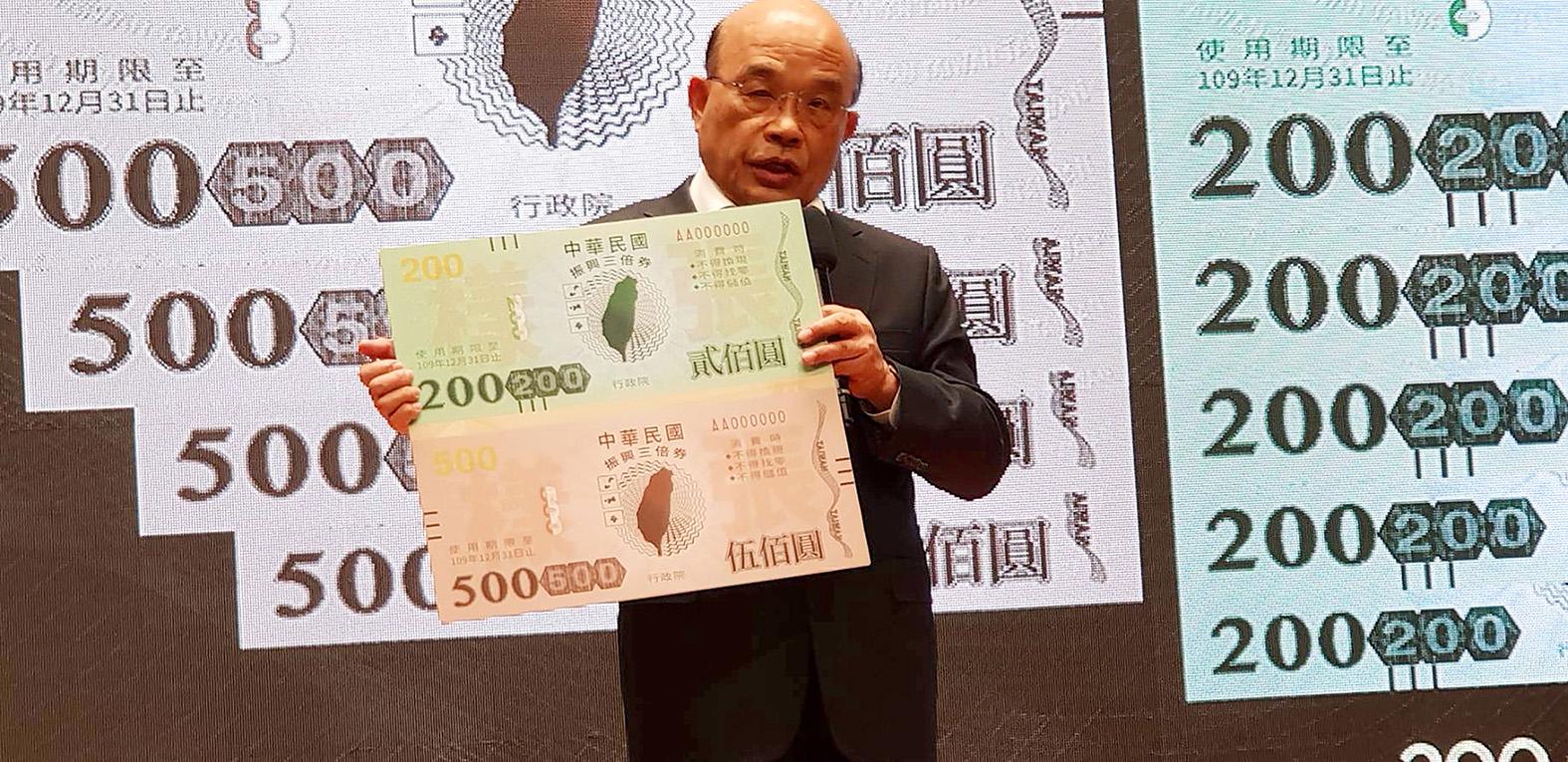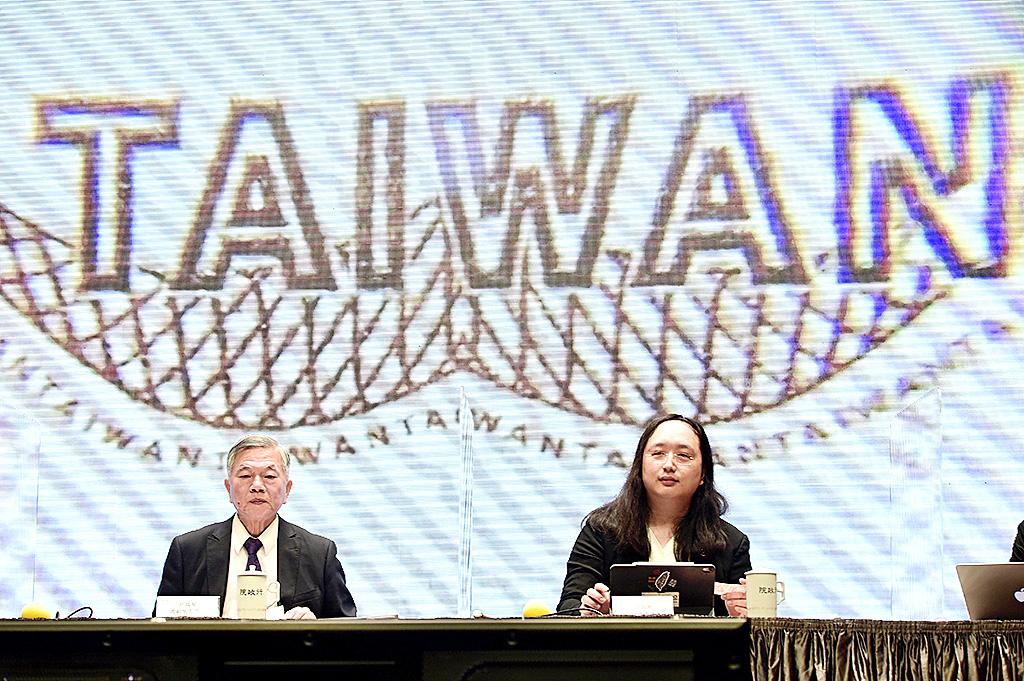Tobie Openshaw is confident that Taiwan’s government has good reasons for not including him in the Triple Stimulus Voucher Program, which launched at the beginning of this month. That’s just as well, because it seems unlikely he’ll ever discover the logic by which it was decided that he, along with other foreign residents not currently married to Taiwan citizens, shouldn’t receive the vouchers.
“We’ve stood side-by-side with our Taiwanese friends through the COVID-19 crisis, complying with government measures, cheering its success and sharing that news with the world at large. If the stimulus coupons are meant to be spent to keep the economy flowing, we’re more than happy to help spread it around,” says Openshaw, a South African documentary filmmaker who’s lived in Taiwan since 1994.
“Surely we deserve a small thank you, just like Taiwan citizens. It’s only [a per person net gain of] NT$2,000, so it’s not about the money,” he adds.

Photo: Lee Hsin-fang, Taipei Times
Openshaw isn’t alone in thinking that the symbolism matters more than the cash. On June 12, CNA reported that European Chamber of Commerce Taiwan Chairman Giuseppe Izzo had decried the government’s different treatment of foreign nationals versus local citizens, and highlighted the Triple Stimulus Voucher Program as a prime example.
The belief that people who live and work in Taiwan should be treated equally when it comes to benefitting from programs which their taxes help fund isn’t universal. Whether it’s shared by the officials who crafted the Triple Stimulus Voucher Program is hard to say, because they’ve shown little willingness to discuss their reasoning.
GOVERNMENT RUNAROUND

Photo: Tsong Chang-chin, Taipei Times
The Ministry of Economic Affairs (MOEA), the department in charge of the voucher program, took nine days to acknowledge a list of questions submitted by the Taipei Times on June 16, and a further eight to provide a detailed response. Even a charitable reading of the MOEA’s statements, which came in the form of an e-mail from Wang Yen-hsiang (王彥翔) of the Small and Medium Enterprise Administration, shows that at least four of the 10 questions went unanswered.
By the usual standards of central government units, which in this reporter’s 24-year experience answer English-language media inquiries promptly and thoroughly, the lack of information regarding a core inquiry — how the government came to its decision to strictly limit the eligibility of non-citizens — has been dismal.
On June 24, because the MOEA had yet to respond, the Taipei Times asked the Office of the Executive Yuan’s Spokesperson whether the eligibility criteria had been finalized by the MOEA or by the Executive Yuan, what reasoning stood behind the decision, and what factors were taken into consideration.
Within a few hours, a message was relayed to this reporter: “The spokesperson’s office... won’t be able to reply, but want to refer you to… the Ministry of the Interior (MOI).”
The MOI is responsible for immigration and naturalization, but on June 29 it advised that, because the voucher program “is mainly handled by the Ministry of Economic Affairs” the Taipei Times should contact the MOEA.
When the MOEA eventually provided their answers on July 3, all they had to say on the issue of eligibility was: “The qualifications of [Triple Stimulus Voucher Program] follow that of the Consumption Voucher Program in 2009 and they were confirmed and prescribed at the beginning of planning.”
In 2009, Taiwan had a different president and a different ruling party.
Taxpaying residents who don’t have a Taiwanese passport or spouse may never know if their exclusion from the stimulus program was down to budgetary calculation, or the application of “citizens first” or “citizens only” principles.
Reciprocity can’t have been a consideration. The US government has been sending out coronavirus stimulus checks to citizens, lawful permanent residents (green-card holders) and qualifying resident aliens. Hong Kong permanent residents aged 18 or above can apply for a HK$10,000 handout; it doesn’t matter what passport they carry.
Despite being asked directly, the MOEA didn’t say if it knew how much it would cost to add every foreigner holding a Taiwan resident card to the program.
A Kaohsiung native surnamed Lin (林), whose wife is Malaysian, is convinced the only reason why foreigners married to Taiwanese qualified for vouchers in 2009 and do so again in 2020 is that no party will risk alienating their spouses. “There’s lots of us. Thousands and thousands of voters,” he says.
Even though everyone in his household will get stimulus vouchers, Lin still gripes about government efforts to soften the economic impact of COVID-19. In his opinion, many of the one-off payments of NT$10,000 or NT$30,000 that were delivered to uninsured workers, farmers, and fishermen this spring went to individuals who didn’t especially need or deserve help.
MIGRANT WORKERS EXCLUDED
Another long-term, taxpaying foreign resident is more upset by the exclusion of migrant workers doing blue-collar jobs than she is by the fact she won’t personally benefit from the program.
“It just seems like such narrow thinking to only make [the vouchers] available to citizens or spouses of citizens. Foreign residents, even those who aren’t necessarily married to locals, are employed here, pay taxes here and are consumers who contribute to the economy here,” says Jenna Lynn Cody, an American married to a Canadian. “There’s no logical reason not to include an entire subset of taxpayers if the goal is a broad economic stimulus. Giving the blue-collar workforce, which includes many people from Southeast Asia, an economic boost is not only the right thing to do, it’s also good for Taiwan.”
While waiting for the MOEA to reply, the Taipei Times contacted the Ministry of Foreign Affairs (MOFA) to ask if excluding approximately 700,000 migrant workers from Southeast Asia who pay taxes and hold alien resident certificates in Taiwan is compatible with the government’s New Southbound Policy.
The policy, which aims to boost Taiwan’s engagement with Southeast Asia, is described on the Executive Yuan’s Web site as being “people centered.” On June 24, MOFA spokesperson Joanne Ou (歐江安) stressed that the voucher program and its eligibility rules “are a matter handled by the Ministry of Economic Affairs. Therefore, the Ministry of Foreign Affairs has no comments on this subject.”
Despite Taipei’s eagerness to build stronger ties with Jakarta and Hanoi, the Indonesian caregivers who look after many of the country’s elderly, and the Vietnamese factory workers who work nights, aren’t in line for stimulus vouchers.
At the same time, it appears that Taiwanese who owe money to the government in the form of tax arrears or unpaid fines will get vouchers — yet the bilingual Web site the government has created to inform the public (https: 3000.gov.tw), isn’t explicit, and the MOEA didn’t answer a direct question on this point.
Despite the MOEA’s failure to address issues that are important to Taipei Times readers, the ministry did clarify that “it is illegal for one person to purchase other people’s coupons” and that “the government has commissioned the Central Engraving and Printing Plant to print the coupons with advanced anti-counterfeiting techniques… [and] we have prepared an instruction video about how to recognize legitimate vouchers and detect forgeries.”
Thanks for that.

In the March 9 edition of the Taipei Times a piece by Ninon Godefroy ran with the headine “The quiet, gentle rhythm of Taiwan.” It started with the line “Taiwan is a small, humble place. There is no Eiffel Tower, no pyramids — no singular attraction that draws the world’s attention.” I laughed out loud at that. This was out of no disrespect for the author or the piece, which made some interesting analogies and good points about how both Din Tai Fung’s and Taiwan Semiconductor Manufacturing Co’s (TSMC, 台積電) meticulous attention to detail and quality are not quite up to

April 21 to April 27 Hsieh Er’s (謝娥) political fortunes were rising fast after she got out of jail and joined the Chinese Nationalist Party (KMT) in December 1945. Not only did she hold key positions in various committees, she was elected the only woman on the Taipei City Council and headed to Nanjing in 1946 as the sole Taiwanese female representative to the National Constituent Assembly. With the support of first lady Soong May-ling (宋美齡), she started the Taipei Women’s Association and Taiwan Provincial Women’s Association, where she

Chinese Nationalist Party (KMT) Chairman Eric Chu (朱立倫) hatched a bold plan to charge forward and seize the initiative when he held a protest in front of the Taipei City Prosecutors’ Office. Though risky, because illegal, its success would help tackle at least six problems facing both himself and the KMT. What he did not see coming was Taipei Mayor Chiang Wan-an (將萬安) tripping him up out of the gate. In spite of Chu being the most consequential and successful KMT chairman since the early 2010s — arguably saving the party from financial ruin and restoring its electoral viability —

It is one of the more remarkable facts of Taiwan history that it was never occupied or claimed by any of the numerous kingdoms of southern China — Han or otherwise — that lay just across the water from it. None of their brilliant ministers ever discovered that Taiwan was a “core interest” of the state whose annexation was “inevitable.” As Paul Kua notes in an excellent monograph laying out how the Portuguese gave Taiwan the name “Formosa,” the first Europeans to express an interest in occupying Taiwan were the Spanish. Tonio Andrade in his seminal work, How Taiwan Became Chinese,